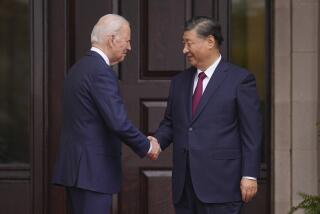China urges Obama to cancel Dalai Lama meeting
BEIJING -- China on Friday urged the U.S. to cancel President Obama’s planned meeting with the Dalai Lama at the White House, saying the visit by the exiled Tibetan spiritual leader would “severely impair China-U.S. relations.”
“Tibet-related affairs fall entirely within the internal affairs of China, which allow no foreign interference,” Foreign Ministry spokeswoman Hua Chunying said in a statement. “The Dalai Lama is a political exile who has long been engaged in anti-China separatist activities under the cloak of religion.”
The private meeting is scheduled to be held in the Map Room of the White House, where the two last met in 2011.
On Thursday, White House spokeswoman Caitlin Hayden said Obama was meeting with the Dalai Lama “in his capacity as an internationally respected religious and cultural leader.” She added that the U.S. has concerns about human rights abuses in the Tibetan areas of China.
“The United States supports the Dalai Lama’s ‘middle way’ approach of neither assimilation nor independence for Tibetans in China,” Hayden said. “We will continue to urge the Chinese government to resume dialogue with the Dalai Lama or his representatives, without preconditions, as a means to reduce tensions.”
Communist troops invaded Tibet in 1950, and the region has long been one of China’s most sensitive issues. In 2008, deadly clashes broke out between monks and authorities there. Since 2009, more than 120 Tibetans have immolated themselves to protest what they see as heavy-handed policies from the central government, which they contend are wiping out customs and traditions.
Chinese officials say their policies in Tibet are aimed at bringing development and stability and raising standards of living; however, officials restrict the access of foreign journalists, diplomats and others to the region, and communicating with people there is often difficult.
For decades, the Dalai Lama has been the spiritual guide of Tibetans, working from his base in Dharamsala, India. In 2011, he announced that he was giving up his role as political leader of Tibetans in exile.
He says he does not seek independence for Tibet but “meaningful autonomy for the Tibetan people that would ensure the long-term survival of our Buddhist culture, our language and our distinct identity.” He has long advocated nonviolent means of protest.
Chinese authorities, however, say the 78-year-old Nobel Peace laureate is a separatist and have accused his supporters of “deceiving” people into setting themselves on fire.
Earlier this week, Zhu Weiqun, a top political advisor to China’s central government, wrote a strongly worded essay on a government website, Tibet.cn, in which he said foreign leaders who meet the Dalai Lama should “pay a price.” In time, he added, the West “will see the real face of the Dalai clique.”
Hua said China had lodged “solemn representations with the U.S. side” about the visit.
Outgoing U.S. Ambassador to China Gary Locke paid a rare visit by a Western diplomat to the region last year, during which he met with residents and officials, stressing the need to preserve Tibetan culture and urging authorities to allow more foreign visitors.
Chinese authorities, however, show little sign of heeding such pleas.
“What should be developed should be developed, and when stability should be maintained, it will be maintained,” Zhu wrote.
China “must totally disregard whatever the West says,” he continued, adding that time is on China’s side.
“As China becomes more involved in international affairs, and as Tibet ... further open(s) to the world, more and more Westerners will have an understanding ... that better accords with reality,” he added.
Twitter: @JulieMakLAT
More to Read
Start your day right
Sign up for Essential California for news, features and recommendations from the L.A. Times and beyond in your inbox six days a week.
You may occasionally receive promotional content from the Los Angeles Times.







